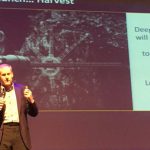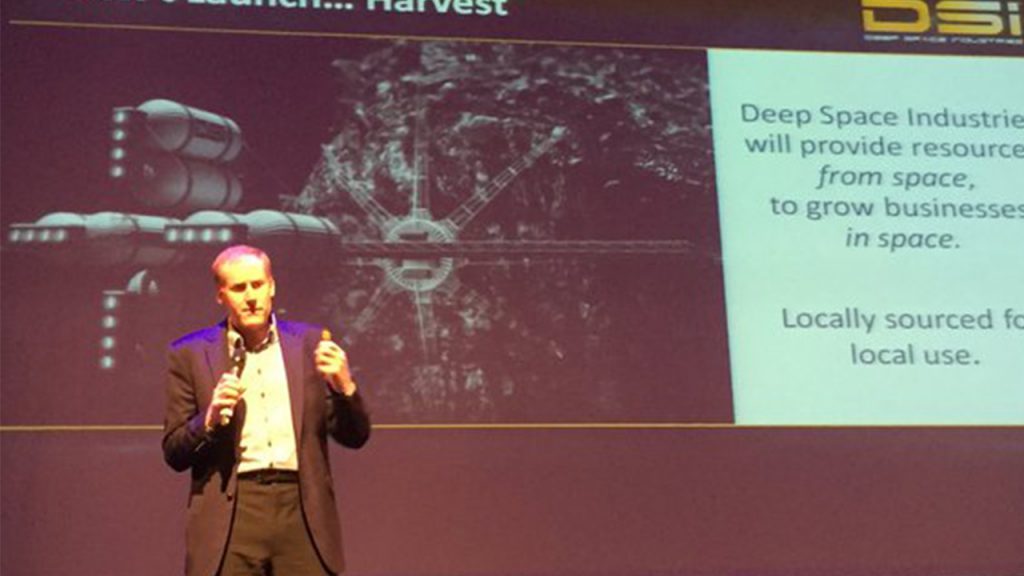With long-term plans for in-space resource extraction in the form of asteroid mining, Deep Space Industries (DSI) is offering an exciting business opportunity. It is aiming to change the economics of space by providing the technical resources, capabilities and systems required to harvest, process, manufacture and market in-space resources. DSI is already generating revenue from commercial contracts, as well as government and university research projects.
The Disrupt Space summit brought together a large number of entrepreneurs from around Europe and the world who are intent on reinventing the space industry. A panel of judges chose Deep Space Industries as the winner among five finalists in a start-up pitch.
Spaceoneers caught up with Daniel Faber, Deep Space Industries’ CEO at the summit to hear about the company’s long-term plans and the exciting business opportunity in asteroid mining.
Spaceoneers: Tell me a little about yourself and what you do at Deep Space Industries
Daniel Faber: I grew up in Australia. I’ve now lived and worked in several countries around the world on four continents. I’ve worked on a lot of small satellite companies, building some of the high performance small spacecraft and run a company in the mining industry and those kinds of things. Now I am with Deep Space Industries and we’re off to mine asteroids. I joined full-time a couple of years ago and took over as CEO.
Spaceoneers: How did the idea for your business come about?
Daniel Faber: So people who were involved in founding Deep Space Industries have been working on this challenge, for some 30-40 years. John Lewis actually signed us. He literally wrote the book on asteroid resources. In fact he’s written many books on satellite resources. He’s very much the godfather of the field. So, a lot of other people have looked at various aspects. One of our directors was one of the first to look at present value economics and how that relates to orbital periods and asteroid dynamics – and that kind of works. So, we came at this from a lot of analysis.
We analysed the terrestrial markets and the applicability of mining asteroids to supply terrestrial markets and realised that wasn’t going to be viable in the near term. And then we analysed the markets on-orbit and found that is much more interesting. And so, we started to build a business model around that, built and incredible team.
We have a great group of engineers and business folk who have come together for this, and yeah, now we’re away. We have put our value proposition out there. We’ve got a great response from the market. We’re building up our technology base and our interim products that are generating revenue and it’s away.
Spaceoneers: How did you get investors behind your idea?
Daniel Faber: We went out and asked. We started with the founding team and a lot of work that we did behind the scenes. We then went out to friends and family, we talked to a lot of people that we knew were interested in seeing this happen and just talked to them about where we were going as a business. They liked what they saw, they liked the team, they liked the ideas and the business model that we had, so they were prepared to back us. And then as we’ve needed funds and as we’ve grown the company and wanted to accelerate what we’re doing, we’ve gone out to capital markets and raised further rounds.
Spaceoneers: What were the biggest challenges to starting your business?
Daniel Faber: So, we had a number of interesting challenges. One of course is that asteroid mining is unlikely to come to fruition in the shirt-term. It’s not a VC fundable play with a 5-year return and those kinds of things. It’s much more like how traditional mining play or medical devices play, where the exit and revenues are ten, fifteen years down the line. So we had to create a business model to really bootstrap what we doing with early revenue coming from the technology with a very methodical plan to overcome a lot of the risks.
There are risk areas from market risk to geological risk to regularity risk, financing risks and those kinds of things. So we had to consider all of those and build a solid plan around mitigating each of those in a way that is robust. We have several mitigation methods for each type of risk and just being able to put that together in a way that was financeable and could be bootstrapped that were a big challenge in founding the company. Because of the team we have and because of the diverse backgrounds, it’s one of the things that our investors saw made us stand out. We have a very solid plan and now we’re executing on that.
Spaceoneers: On the legal side, President Obama has now signed into US law the go ahead to asteroid mining. What is your take on that?
Daniel Faber: Yes, the law that was signed by the US, that legislation recognised for the first time explicitly that commercial asteroid mining is a thing. Previously it wasn’t disallowed, which by its very nature by the conventions of law, if not disallowed it is therefore allowed. But it was also required of the US, as it is of every country, to regulate the activities of their citizens and their companies in space. So they US were obliged under international law to regulate activities of companies like Deep Space Industries. So, the legislation they put together was very respectful of the outer space treaty and the requirements under that, and the wording of that treaty. And so it doesn’t assert any ownership or sovereignty, anything like that but it recognises the rights of companies to own what they extract from the asteroid, in a similar way to ships on the open sea, in international sea waters. They can own the fish that they catch.
So, we will wait to see what the regulations actually look like and what the administrative processes will be. We know that other countries are looking to do similar things and enact legislation, so very keenly watching what’s going to happen. At the moment, the reaction from the global community has been quite positive and there’s good reason for this. The more we are able to do in space, the better services we are able to deliver to customers on the ground. So being able to provide an extremely, much more capable communications satellite because you don’t have to lift everything from the ground at massive expense, and you can make much bigger antennas, and everything else. It’s going to allow much better services to every country on the ground. Those kinds of benefits are only going to happen if this moves forward. And that’s one of the things that are really driving a positive response internationally.
Spaceoneers: What important advice would you give to others who are interested in starting their own space start-up?
Daniel Faber: Don’t start an asteroid mining start-up! No, I’m kidding on that. There’s a huge number of changes, so design your business around what will happen in ten years time not what’s existing today because the market is going to look so different by then. There’s an incredible amount of changes, so yes, focus on executing for your customers and that will lead to success.
Spaceoneers: How did you first get your team together?
Daniel Faber: Our team came together by having discussed asteroid mining in various aspects on a technical side and a theoretical side previously but also just relationships that we had. The space industry is a pretty small industry, and so a lot of us knew each other from various conferences and various places that we met and talked and had those discussions. So when that idea came up, there was space in the market for an asteroid mining company. The time was right because the technology had reached a certain point and therefore it looked like it was feasible. Our analysis was showing it was feasible. And just naturally the founding team came together, they were able to bring in other talent and move forward.
Spaceoneers: What makes you a spaceoneer?
Daniel Faber: What makes me personally a space pioneer? I think that, well, the reason I’m in this is because I got to university in my first year of undergrad and didn’t know what I was going to do with my life. Eventually I got bored of hand gliding and windsurfing, and racing solar cars and various things that I could do at university. I decided that in order to bring some benefit to the world and help the most number of people, it was important to look at existential risks and how can we avoid risks that are on a global scale? Getting off this rock really does allow us to address some existential risks, so that to me was one of the most beneficial things that could be done but also possible in my lifetime.
So I looked at the ways that that could be made to happen and very much believed that government programmes are going to be limited in how much they can do. So it had to be a commercial endeavour and I started then thinking about what sorts of industries and businesses would eventually be able to support permanent jobs in orbit, again bootstrapping to a point where we have civilisation and cities in space. And so, it was a fairly short list. The thing at the top of the list for me was mining, so through my career I’ve always been trying to polish business plans, trying to find the opportunities, trying to create the technologies to move towards a point where asteroid mining would be feasible. We crossed that threshold a couple of years ago and immediately set up Deep Space Industries to take advantage of that.
I’ve always had an entrepreneurial bent and this is my, I think, seventh start-up company if you include non-for-profits and consulting companies I set up for myself. So, I’ve been an entrepreneur for a while in the mining industry and the space industry and so now I don’t know how to be anything else.

